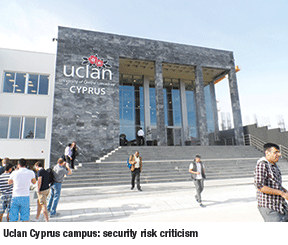United Kingdom: Foreign foray problems
 LAST YEAR WAS NOT A VINTAGE YEAR FOR the university of Central Lancashire’s attempts to gain a foothold in overseas markets. In November it emerged that it will lose up to £3.2 million (Rs.32 crore) in the collapse of its planned Thailand campus. The university set up a joint venture company with the president of a Thai duty-free storage company that would own and run the campus, which was to open late last year. But the joint venture failed to complete the purchase of all the land needed after the partner’s “circumstances changed”.
LAST YEAR WAS NOT A VINTAGE YEAR FOR the university of Central Lancashire’s attempts to gain a foothold in overseas markets. In November it emerged that it will lose up to £3.2 million (Rs.32 crore) in the collapse of its planned Thailand campus. The university set up a joint venture company with the president of a Thai duty-free storage company that would own and run the campus, which was to open late last year. But the joint venture failed to complete the purchase of all the land needed after the partner’s “circumstances changed”.
In the same month, Uclan won praise from UK foreign secretary William Hague over its plans for expansion into Sri Lanka, where the government has given the go-ahead for it to be the first overseas university to open a campus in South Asia. But accusations of war crimes have been levelled against the Sri Lanka government after up to 40,000 people were killed during the brutal conclusion of the country’s civil war in 2009. Uclan praises the government’s “commitment to engage” with the United Nations Human Rights Council “in a spirit of openness and constructive dialogue”. But Amnesty International UK told Times Higher Education that Uclan should “take note of the country’s appalling human rights record”.
Both these episodes came just months after Uclan’s Cyprus campus was criticised as a security risk by the UN secretary-general, Ban Ki-moon, who is concerned by the campus’ location in the buffer zone separating the island’s Greek and Turkish communities. Uclan, which opened the campus in October 2012, has also been under pressure to prove that Cyprus is a fertile ground for student recruitment. The University of East London was forced to close its Cyprus campus in 2013 after recruiting only 17 students.
With UK universities increasingly looking to expand overseas, some believe that Uclan’s dealings raise important questions for higher education as a whole. Comments Sally Hunt, general secretary, the University and College Union: “Uclan’s sorry episode in Thailand should be a wake-up call to everyone in the sector. UK universities’ overseas adventures are placing their funds, asset bases and reputations at risk. To avoid this, universities need to come clean about their overseas projects and open them up to proper public scrutiny and regulation.”
In Uclan’s complex corporate structure, the overseas ventures — Uclan Cyprus Ltd, Uclan Lanka (Private) Ltd and Uclan (Thailand) Company Ltd — are all subsidiaries of Uclan (Overseas) Ltd. The 2011 Uclan (Overseas) accounts show a sudden £9.3 million (Rs.94 crore) increase in cash deposits compared with the previous year. Asked about the source of this funding, and whether it was public funding in some form, a Uclan spokesman said: “The money came direct from Uclan and was built up from other overseas activities (in China) over several years.”
Uclan’s corporate plan, updated for 2013-14, explains the broader thinking behind its overseas ventures. “Over the next five years, we expect to see some decrease in full-time undergraduate numbers on UK campuses,” says the plan. To balance the fall in UK students, Uclan forecasts: “The number of overseas students studying on Uclan or partner institution campuses abroad will rise, assisted by the development of Uclan joint venture campuses in Cyprus, Thailand and Sri Lanka, moving to greater levels of in-country teaching.”
Last year, Uclan also signalled the importance of its overseas campuses by moving to a “group structure”, in which the international offshoots are managed separately from the UK campus — with all campuses under the overall leadership of Malcolm McVicar, formerly vice chancellor and now group chief executive.
(Excerpted and adapted from Times Higher Education)















Add comment